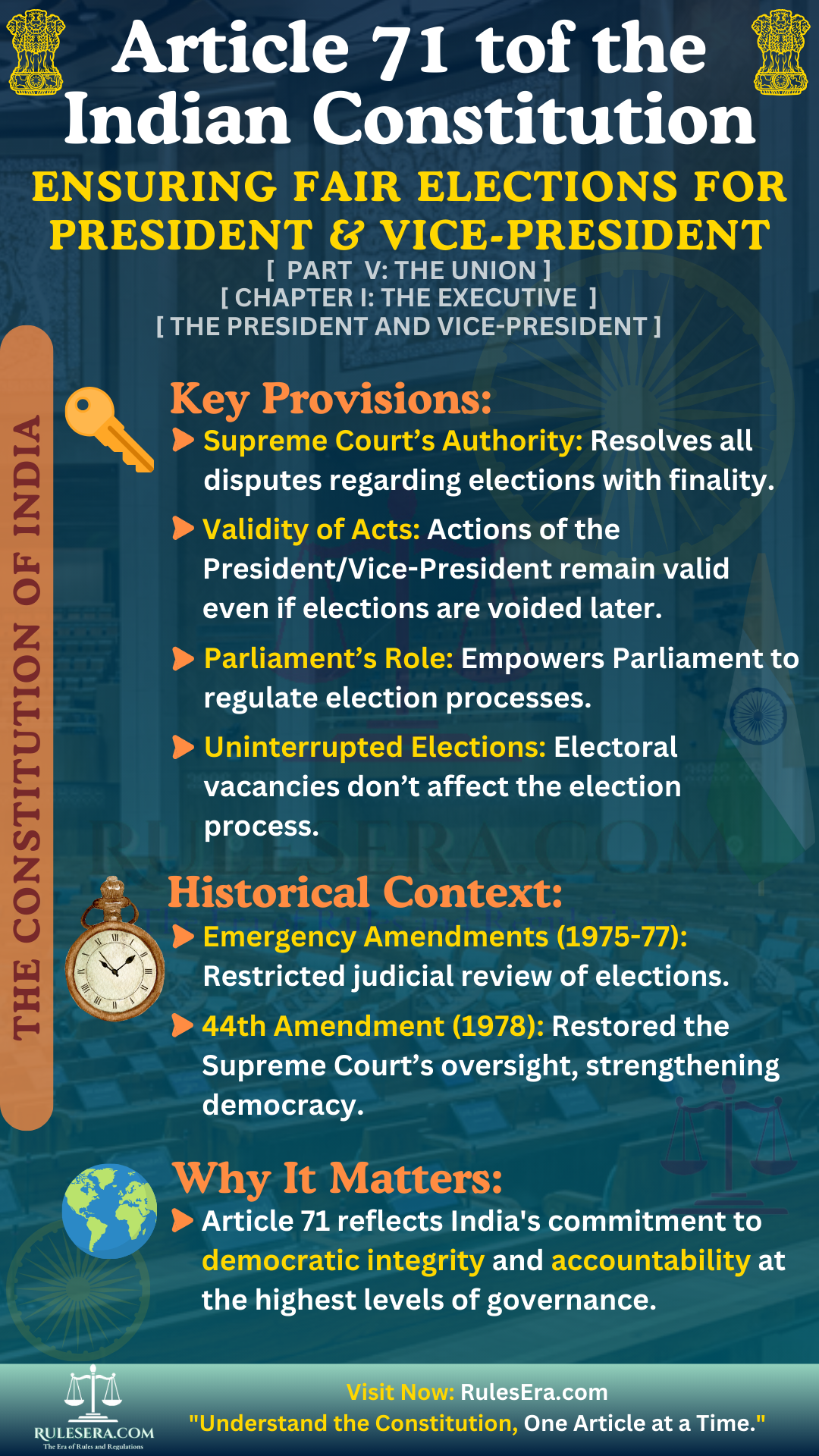Part V: The Union
Chapter I: The Executive
Article 71: Matters relating to, or connected with, the election of a President or Vice-President

--- Original Article ---
(1) All doubts and disputes arising out of or in connection with the election of a President or Vice-President shall be inquired into and decided by the Supreme Court, whose decision shall be final.
(2) If the election of a person as President or Vice-President is declared void by the Supreme Court, acts done by him in the exercise and performance of the powers and duties of the office of President or Vice-President, as the case may be, on or before the date of the decision of the Supreme Court shall not be invalidated by reason of that declaration.
(3) Subject to the provisions of this Constitution, Parliament may by law regulate any matter relating to or connected with the election of a President or Vice-President.
(4) The election of a person as President or Vice-President shall not be called in question on the ground of the existence of any vacancy for whatever reason among the members of the electoral college electing him.
1. Subs. by the Constitution (Thirty-ninth Amendment) Act, 1975, s. 2 (w.e.f 10-8-1975) and further subs. by the Constitution (Forty-fourth Amendment) Act, 1978, s. 10. (w.e.f. 20-6-1979).
Introduction
Article 71 of the Constitution of India focuses on the resolution of disputes and legal challenges arising from the elections of the President and Vice-President. It assigns the role of adjudicating these disputes to the Supreme Court, ensuring the sanctity of the election process. The article also empowers Parliament to regulate the election process through legislation, subject to constitutional guidelines.
Clause (1): Finality of the Supreme Court’s Decision
This clause mandates that all doubts and disputes related to the election of the President or Vice-President must be referred to the Supreme Court. The Court’s decision in these matters is final, ensuring that any challenges to the election are handled by an impartial and authoritative institution. This safeguards the election process from prolonged or politically motivated disputes.
Clause (2): Preservation of Acts Performed During Tenure
Even if the Supreme Court declares the election of the President or Vice-President invalid, any actions performed by the officeholder before the Court’s decision will remain valid. This provision prevents legal and constitutional crises, ensuring that the administrative functions of the government remain intact, regardless of the outcome of the dispute.
Clause (3): Legislative Power of Parliament
This clause empowers Parliament to regulate matters connected to the election of the President or Vice-President. Parliament’s ability to legislate on such matters ensures that the electoral process remains structured and consistent with evolving political and legal requirements, while staying within the bounds of the Constitution.
Clause (4): Continuity in Electoral College
This clause stipulates that the election of the President or Vice-President cannot be challenged based on vacancies in the electoral college. It ensures that temporary vacancies in the electorate do not hinder the election process, thereby promoting continuity and stability in filling these high offices.
Amendments
The Constitution (Thirty-ninth Amendment) Act, 1975, originally aimed to shield the elections of the President and Vice-President from judicial scrutiny, following political turmoil during the Emergency period. This amendment was a significant departure from the democratic ethos, as it sought to protect incumbents from legal challenges.
The Constitution (Forty-fourth Amendment) Act, 1978, reversed some of the changes introduced by the Thirty-ninth Amendment. It restored the Supreme Court’s role in adjudicating disputes regarding these elections, re-establishing the principle of judicial oversight in India’s electoral system.
Real-Life Example
In 1974, during the tenure of President Fakhruddin Ali Ahmed, political controversies led to significant legal debates surrounding presidential elections. Though these disputes did not reach the point of an election being declared void, the amendments during the Emergency period (1975-1977) were aimed at preventing such challenges. Later, the 44th Amendment ensured that the Supreme Court’s authority was restored.
Historical Significance
The amendments to Article 71 reflect India’s political history, particularly the controversial period of the Emergency (1975-1977). During this time, significant constitutional changes were made to limit judicial review and centralize power. However, the subsequent Forty-fourth Amendment marked a return to democratic norms, restoring the Supreme Court’s role in maintaining the integrity of the election process. Article 71 is a testament to the resilience of India’s democratic framework and its commitment to accountability, even at the highest levels of government.
Frequently Asked Questions (FAQs):
The Supreme Court has the final authority to decide on disputes and doubts arising from the election of the President or Vice-President under Article 71.
Yes, under Article 71, Parliament has the power to legislate matters related to the election of the President or Vice-President, subject to the Constitution.